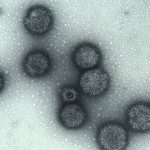Lien vers Pubmed [PMID] – 23597784
J. Infect. 2013 Aug;67(2):141-7
OBJECTIVES: Influenza seasonality remains poorly studied in Equatorial regions. Here we assessed the seasonal characteristics and environmental drivers of influenza epidemics in French Guiana, where influenza surveillance was established in 2006.
METHODS: Sentinel GPs monitored weekly incidence of Influenza-like illnesses (ILI) from January 2006 through December 2010 and collected nasopharyngeal specimens from patients for virological confirmation. Times series analysis was used to investigate relationship between ILI and climatic parameters (rainfall and specific humidity).
RESULTS: Based on 1533 viruses identified during the study period, we observed marked seasonality in the circulation of influenza virus in the pre-pandemic period, followed by year-round activity in the post-pandemic period, with a peak in the rainy season. ILI incidence showed seasonal autoregressive variation based on ARIMA analysis. Multivariate dynamic regression revealed that a 1 mm increase of rainfall resulted in an increase of 0.33% in ILI incidence one week later, adjusting for specific humidity (SH). Conversely, an increase of 1 g/kg of SH resulted in a decrease of 11% in ILI incidence 3 weeks later, adjusting for rainfall.
CONCLUSIONS: Increased rainfall and low levels of specific humidity favour influenza transmission in French Guiana.

